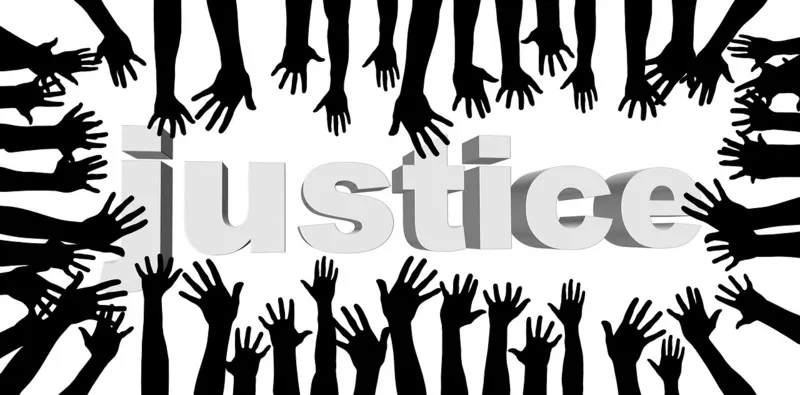
"Injustice anywhere is a threat to justice everywhere. " -Martin Luther King, Jr.
Social justice as a concept was present long before the phrase was created.
The concept can be found as far back as the fourth century in the writings of Augustine, Bishop of Hippo.
Other philosophers and religious leaders also wrote about components of what we now call social justice such as equality and “natural rights.” They taught that natural rights were inalienable and universal- unrelated to any particular culture or form of government.
What those rights included has evolved over the years, but at the core, there was the belief that all people had certain natural rights solely on basis of being human. Today, “natural rights” are more commonly referred to as human rights.
Luigi Taparelli, a Jesuit priest and scholar, is often credited with coining the term “social justice” in the mid-1800s. But Alexander Hamilton used the phrase in The Federalist Papers No. 7 that was published on November 15, 1787.
The term gained greater use during the economic and political changes in 19th century Europe. In the United States, social justice became an issue during the Industrial Revolution. As the country prospered, the inequalities between the rich and the poor became increasingly pronounced.
In 2007, the UN passed a resolution setting aside February 20 as the World Day of Social Justice
Here are five fundamental beliefs that undergird the work for social justice:
• Dignity of the human being – all humans have basic necessities and rights.
• Primacy of the common good – make choices that benefit everyone.
• Reciprocal rights and responsibilities – the right to have a conscience and the responsibility to be kind to others.
• Dignity of work and rights for workers – all people have the right to work safely.
• Requisite option for the poor and the vulnerable – ensure that the marginalized in society receive care.
And WorldDayofSocialJustice.com proposes that social justice is guided by four principles:
Principle #1: Human rights
Social justice and human rights are technically different, but one cannot exist without the other. They share many goals. Social justice is still more commonly associated with economic and social rights, but it’s more powerful when it encompasses all human rights. When working for social justice, a human-rights approach has many benefits. A major benefit is that social justice goals are clearer when framed by international human rights standards. A just society is less than complete when anyone’s human rights are violated.
Principle #2: Participation
This means that everyone should be able to participate in the processes that affect their lives. In many societies, only certain groups can fully participate due to class and educational barriers. All individuals must be given the opportunity to participate. That includes providing resources so people can learn about the issues at hand and how to get involved. It also means purposely inviting advocates that speak for underrepresented groups, so their interests can be heard.
Principle #3: Access
A just society provides services and resources that are available to all, not just a few. In most societies, access is inconsistent. People’s access to resources like quality education and healthcare is limited based on factors like geography, gender and socioeconomic standing. Restricting access to essential rights fuels cycles of poverty, which widens a society’s equality gap.
Principle #4: Equity
How is equity different from equality? Equality is the goal while equity is the method by which societies achieve that goal. In unjust societies, there are always disenfranchised groups. These groups need more support and resources than those with privilege. The finish line is the same for both of them, but they’re starting at very different places. Equitable solutions are essential to participation and access. Using equity as a framework, it’s possible to make more resources and support available and remove barriers to participation.
For Your Reflection & Action
Quotes
"Where justice is denied, where poverty is enforced, where ignorance prevails, and where any one class is made to feel that society is an organized conspiracy to oppress, rob and degrade them, neither persons nor property will be safe." -Frederick Douglass
"There may be times when we are powerless to prevent injustice, but there must never be a time when we fail to protest." - Elie Weasel
"Our lives begin to end the day we become silent about things that matter." -Martin Luther King
"Social justice cannot be attained by violence. Violence kills what it intends to create." -Pope John Paul II
"The challenge of social justice is to evoke a sense of community that we need to make our nation a better place, just as we make it a safer place." -Marian Wright Edelman
"Justice and power must be brought together so that whatever is just may be powerful, and whatever is powerful may be just." - Blaise Pascal
Poems
Good Bones by Maggie Smith
Equality by Maya Angelou
Ballad of the Landlord by Langston Hughes
Questions for Self-Reflection
Why is social justice important?
How does injustice affect me and my community?
What can I do to work for social justice?
References
United Nations Resolution adopted by the General Assembly on 26 November 2007
United Nations Observances: Social Justice Day
Image by Gerd Altmann from Pixabay